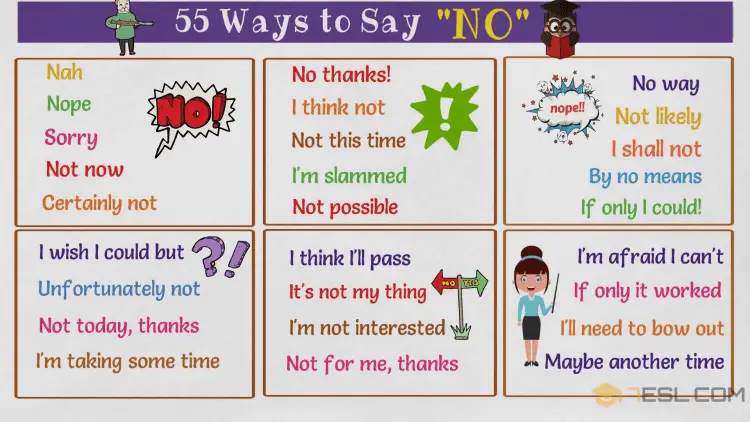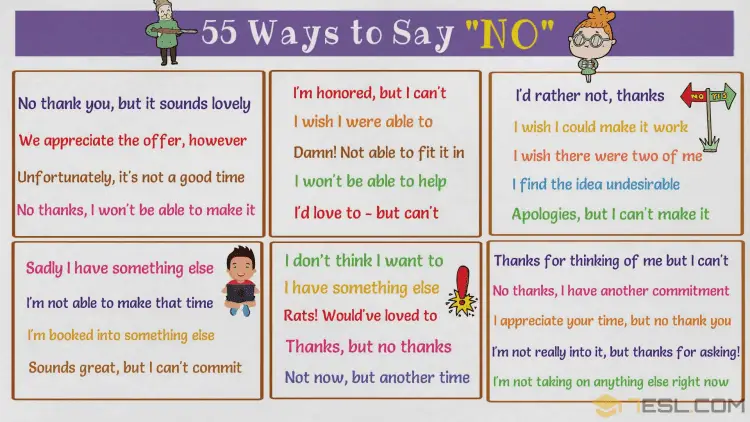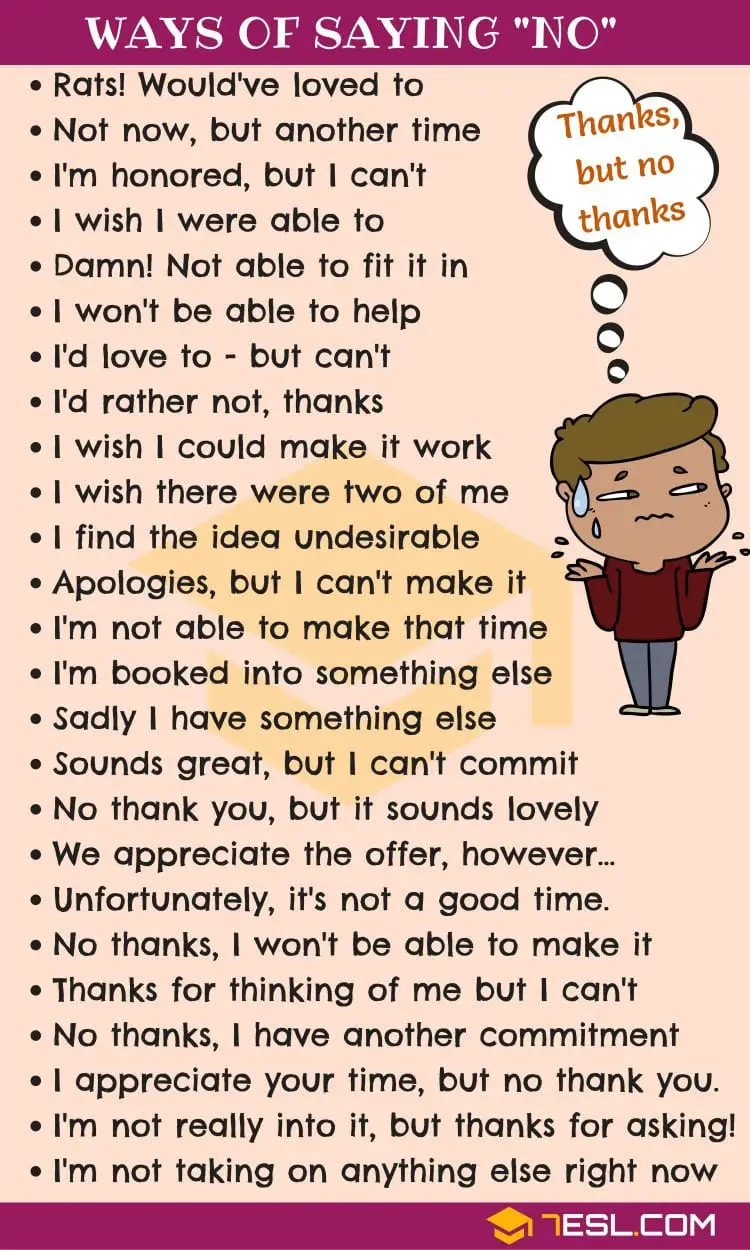
No Synonyms
Less formal ways of saying ‘no’
Nope
‘Nope’ is used as an informal way of saying no, but only when answering a yes or no question, usually when the answer is not of great significance to the person who asked the question. You often smile when you say ‘nope’.
‘Nope’ can never be used in the middle of a sentence, and shouldn’t be used if the person who asked the question is going to be annoyed or upset by you giving a negative answer.
Example 1.
It’s 8 o’clock at night and you were supposed to have dinner on the table, but you fell asleep and haven’t made dinner. You know person 1 will be very angry that you didn’t do what they asked. Saying ‘nope’ will only make them angrier. Instead, answer something like:
- Person 1: Is dinner ready?
- Person 2: I’m so sorry but I fell asleep and didn’t make anything, but let me order a pizza! What do you want on yours?
Example 2.
Person 1 is looking for something at work. They don’t seem particularly worried. You can use ‘nope’, as your answer isn’t particularly significant to them.
- Person 1: Have you seen my stapler?
- Person 2: Nope.
Nah
Like ‘nope’, ‘nah’ is an informal way of saying ‘no’. Although it’s also only used to answer yes or no questions, it’s used in a different context. Nah is often used when someone asks if you want / need anything, for example:
- Person 1: Do you want a lift?
- Person 2: Nah, I’m alright thanks.
Or if you can’t be bothered to do something:
- Person 1: Do you want to go to the shops today?
- Person 2: Nah.
Saying ‘no’ softly
Sometimes you want to say no, but either you’re not sure or you want to soften your answer, because the person you’re answering will be offended by a negative answer.
Not really / Not particularly /not especially
‘Not really’ can be used to say ‘no’ when you want to say ‘no’ softly.
- Person 1: Did you like my friend Sarah?
- Person 2: Erm… not really.
However, it can also be used to mean ‘not very much’:
- Person 1: Was he sorry that he ruined the party?
- Person 2: Not really.
Not quite / almost
You can use ‘not quite’ and ‘almost’ when something is very nearly finished. It can also be used to give someone feedback, to make them feel positive about their work even though it hasn’t reached the standard you were expecting.
- Person 1: I’ve finished this piece of work. Is it good enough to give to the client?
- Person 2: Not quite, but if we make a few small changes we can send it over.
Saying ‘no’ very strongly
Sometimes you want to say ‘no’ very strongly to answer a question. In these situations, you can use definitely, or absolutely not.
These forms shouldn’t be used when you’re trying to be polite, as they can often be interpreted as rude.
However, in an informal context they’re perfect for answering ‘no’ very strongly. There are lots of other ways of saying ‘no’ strongly:
Absolutely not synonyms (Formal)
- It’s of the question
- Certainly not
- Under no circumstances
Informal
- Not on your life
- Not on your nelly
- Not in a million years
- Fat chance
- No fear
- Person 1: Can I use your phone to call my mum?
- Person 2: Certainly not. She’s in India, it’ll cost a fortune!
- Person 1: Will you be going to the party later?
- Person 2: Not in a million years!
- Person 1: Will you go on a date with me?
- Person 2: Fat chance

Question from our readers: What is the best way to refuse / reject someone’s company which we don’t want to encourage?
Polite ways of saying NO
You usually use the word ‘no’ when you want to give a negative answer to a question or to a request. However, in some situations, if you simply reply with ‘no’, you could offend the person you’re talking to, so here are some other ways to say no:
- No thanks.
- I appreciate you thinking of me, but no thank you.
- Not for me, thanks.
- I’m afraid I can’t (do something).
- I’d rather not, thanks.
If someone asks if you want something, and you don’t want it
This is what the situation would look like if you just said ‘no’.
- Person 1: Would you like a tea or coffee?
- Person 2: no.
However, in most English-speaking countries, this would be considered very rude. Instead you could reply with:
- Person 1: Would you like a tea or coffee?
- Person 2: No, thank you.
- Person 1: Would you like a tea or coffee?
- Person 2: I’m fine, thanks.
- Person 1: Would you like a tea or coffee?
- Person 2: I just had one, thank you.
Or even a combination of two of the two answers above:
- No, I’m fine thanks.
- I’m fine, I just had one thanks.
If someone offers to help you but you don’t need help
In these situations, often explaining what you’re doing, or that you’ve already asked someone else for help works instead of ‘no’:
You walk into a shop and the shop assistant approaches you:
Shop assistant: Can I help you at all sir?
You: I’m just looking, thanks.
You’ve broken down at the side of the road and someone stops:
Another driver: Are you okay? Do you need any help?
You: I’ve already called the breakdown service, thanks.
If someone asks you for something, but you can’t oblige
Sometimes people ask you for things and you can’t help them. Using ‘can’t in your reply softens it, and makes it much more polite.
I’m sorry, I can’t right now.
In these situations, if you’d be happy to help them another time, say so! It comes across as much more polite than if you just say ‘no’, especially in formal or work contexts.
Ways in which you can do this are:
- I’m afraid I can’t today, but next week I’ll have more time and would love to help.
- My plate’s really full at the moment, but I’ll try to get back to you as soon as possible.
- I can’t help you this time around, but I’ll be happy to help next time.
If someone asks you for something, but you don’t want to oblige
In these situations, instead of saying ‘no’ (which could come across as rude) you could give a reason or an excuse for why you can’t help the person.
Someone asks if you want to do something, but you don’t, and don’t want to say why:
- Person 1: Do you want to go to London with me at the weekend?
- Person 2: I’d rather not, thanks.
Someone asks you on a date. You don’t want to go, but you don’t want to be rude:
- Person 1: Do you want to have coffee some time?
- Person 2: Sorry, I’m really busy at the moment, but maybe some other time?
Someone asks for your help but you’re in a hurry and can’t stop:
- Person 1: Could you help me move this bookshelf quickly?
- Person 2: I’m so sorry but I’m late for work / my train / my class
Someone asks if you want to go to a concert, but you don’t really like the music:
- Person 1: Do you want to go to a heavy metal concert with me on Saturday?
- Person 2: Thanks, but I’m not really into heavy metal.




























